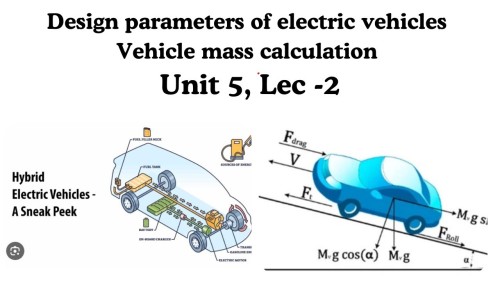Evs And Batteries Concepts, Parameters & Calculations

Evs And Batteries: Concepts, Parameters & Calculations
Published 9/2025
MP4 | Video: h264, 1280x720 | Audio: AAC, 44.1 KHz, 2 Ch
Language: English | Duration: 2h 34m | Size: 1.06 GB
Electric Vehicle, Battery, Simulink
What you'll learn
Understand the fundamentals of electric vehicles, including their need, classification, architecture, advantages, and environmental impact.
Differentiate between primary and secondary cells, and explain the structure of battery systems from cell to module to complete battery pack.
Define and calculate key battery parameters such as capacity, energy density, specific energy, power density, C-rate, SOC, SOH, DOD, and efficiency.
Apply practical knowledge to battery pack design, perform sizing and C-rate analysis, and evaluate efficiency using real-world case studies.
Requirements
Basic knowledge of physics and electricity (concepts like current, voltage, and power will be helpful).
Description
EVs and Batteries: Concepts, Parameters & Calculations is a structured course that introduces students to the fundamentals of Electric Vehicles (EVs) and their energy storage systems. The course begins with an overview of EVs, comparing them with Internal Combustion Engine (ICE) vehicles, exploring classifications, and studying the working of four different EV types. Students will critically analyze the advantages and disadvantages of EVs, along with their social and environmental significance.The second part of the course focuses on batteries—the core of EV technology. Learners will study the definition and classification of batteries (primary and secondary), series and parallel cell connections, and the hierarchy of cells, modules, and packs. Key parameters such as power density, energy density, specific energy, State of Charge (SOC), Depth of Discharge (DOD), State of Health (SOH), C-rate, and efficiency are introduced with real-world context.Practical learning is reinforced through MATLAB/Simulink-based simulations. Students will design a 48V battery pack unit, perform C-rate verification, and evaluate performance using simulation tools. The course also integrates quizzes, multiple-choice questions, and numerical exercises to strengthen problem-solving skills and ensure a solid grasp of theoretical and practical concepts.By the end of the course, participants will gain both conceptual clarity and hands-on experience, preparing them for further studies and careers in EV technology, battery systems, and sustainable mobility solutions.
Who this course is for
Engineering students (electrical, electronics, mechanical, automotive) who want to build a solid foundation in EVs and battery technology.
Researchers and academicians exploring electric mobility, renewable energy integration, and battery performance analysis.
Industry professionals in automotive, energy, or power systems looking to upskill in EV design and battery applications.
EV enthusiasts and learners who are curious about how electric vehicles and batteries work, from concepts to calculations.
Aspiring EV entrepreneurs or startup founders aiming to enter the electric mobility or battery technology sector.
Buy Premium From My Links To Get Resumable Support and Max Speed
https://rapidgator.net/file/66ae4c90638bcd45dffb3f9cbe39f5d4/EVs_and_Batteries_Concepts,_Parameters_&_Calculations.part1.rar.html,_Parameters_&_Calculations.part2.rar.html

Information
Users of Guests are not allowed to comment this publication.



